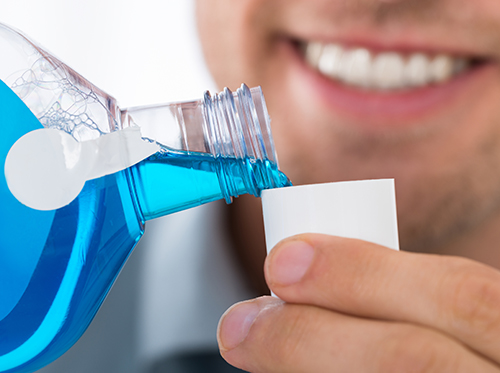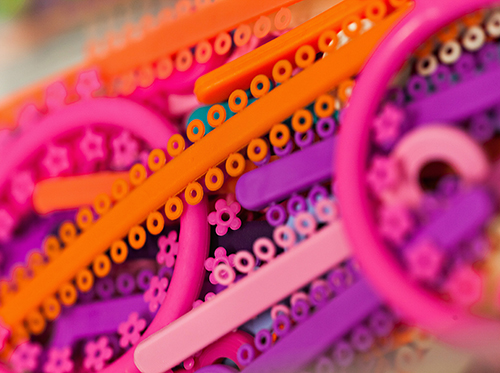March 29th, 2017

Although using mouthwash is certainly not the equal of brushing and flossing, it does have benefits for your dental hygiene. If you use mouthwash regularly, you should find out which type is best suited for your needs. Here are some things to think about the next time you’re at the store.
The first item to weigh is why you want to use mouthwash. If the reason involves a high risk for cavities, you should focus on a mouthwash that contains fluoride. Make sure to double-check the label, because some mouthwashes do not necessarily include fluoride.
If you’re looking for a mouthwash to fight gingivitis, select an oral rinse with antibacterial properties. Make sure to read labels and avoid picking one that contains alcohol. Antibacterial mouthwash would also be best for a patient who has periodontal disease.
Another option is prescription mouthwash. These should be discussed with Dr. Jason Jones and/or your pharmacist in order to avoid negative side effects. Pay close attention to the directions regarding how much to use and for how long. Keep in mind that some brands may lose their effectiveness if you use them on an ongoing basis.
For children, you can find a mouthwash that changes the color of plaque on their teeth. This is a fun way to help them understand how well they are brushing, and what areas they need to focus on. It can even be a tool for adults who have trouble reaching certain areas of their mouth.
While mouthwash is generally considered as a safe means to improve your oral health, you need to keep certain things in mind. Avoid using any mouthwash that has alcohol in it. If you are using a strong one, it can reduce your sense of taste over time. Be wary of a mouthwash that claims it can loosen plaque; this is not accurate and can mislead consumers.
We hope these simple suggestions will help you the next time you’re at the store. Make sure you pick the right mouthwash to keep that healthy smile! Feel free to contact Dr. Jason Jones at our Hamburg or Amherst, NY with any questions you may have.
March 22nd, 2017

A solid oral health routine begins with daily brushing, flossing, and rinsing. Without a consistent oral health regimen, you may begin to experience tooth decay and bacterial infections. Few patients ask Dr. Jason Jones about different mouthwash options, so we’ve put together a list of the conditions that mouthwashes can treat. This should help you decide which oral rinse would be best for you.
Gum Health
Antiseptic mouthwashes reduce large amounts of bacteria on and near the gum line and generally help to decrease your chances of developing gingivitis. The key ingredients of antiseptic mouthwashes are antibacterial and antimicrobial items. Antiseptic mouthwash is a preferable option if you are concerned about the general gum health of your mouth.
Fluoride
Fluoride is a great tool for preventive tooth decay treatment. It prevents tooth decay and is great for oral health in general because it kills germs that can live in your mouth. Fluoride also builds stronger teeth. If you’re a bottled water drinker, Dr. Jason Jones may recommend that you purchase a simple fluoride rinse to use after brushing.
Bad Breath
Fluoride mouthwash can be used to fight any bad breath issues you may be facing. It’s designed to combat any bacteria that might be building up in your mouth. Most mouthwashes will help eliminate bad breath, but some are specifically designed to address this difficult problem. If you feel as though this might be turning into a chronic problem, please contact Dr. Jason Jones to discuss other options that would be effective for treating your symptoms.
American Dental Association (ADA Approval)
The ADA reviews all mouth rinses for safety measures and to prove effectiveness. Any mouthwash approved by the ADA has met strict guidelines according to whether the manufacturer’s claims are supported with scientific evidence. If you’re looking for a quality mouthwash, look for one that has the ADA seal of approval to ensure you have a great rinse for your mouth.
Considerations
When you’re trying to decide which mouthwash to pick, contact our Hamburg or Amherst, NY or ask Dr. Jason Jones during your next appointment. If you experience a burning sensation in the soft tissues of your mouth, be sure to discontinue use immediately. Avoid letting children under age six use a mouth rinse, and be sure to keep all mouthwashes out of the reach of children, because they contain alcohol and other substances that could be harmful.
March 15th, 2017

There's something special about customizing the elastics on your braces to fit your unique personality. Once you embrace your braces (no pun intended) you'll realize how many color options and combinations there are to choose from. Although you'll have a fantastic smile afterward, you won't have this level of customizability once your braces come off, that's for sure!
Adding flair to your braces isn't what all patients are looking to do (like those opting for clear aligners or ceramic braces), but it's part of the fun of traditional metal braces! Many of our patients ask Dr. Jason Jones to have their elastics match the colors of their favorite sports teams or their school, but how about changing your elastics to match holiday colors?
Here are some options to consider:
- Valentine’s Day – Red and pink
- Easter – Pink, blue, and violet
- Halloween – Orange and black
- Christmas – Red, green, and white
- Saint Patrick’s Day – Green and white
There are a few colors that some people choose to avoid. But if you’re trying to make your teeth stand out in a crowd, the following suggestions need not apply!
- Brown or Green – can be mistaken for food being stuck in your teeth
- Black – might look like a rotten tooth if someone isn't looking hard enough
- White – Some patients think it will make their teeth look whiter, but in fact it can make your teeth appear yellower than they actually are. White elastics can also stain easily.
- Yellow – accentuates the yellowness of your enamel
Since changing the color of your elastics has no effect on the actual orthodontic treatment process, the idea is to have fun and add a personal touch. So, next time you get your elastics changed at our Hamburg or Amherst, NY office, why not wear your braces boldly and opt for something festive?
March 8th, 2017

Do you ever find yourself gnawing at your nails? Nail-biting is a very common and difficult to break habit which usually has its beginnings in childhood. It can leave your fingers and nail beds red and swollen. But if you think that your nails are the only ones getting roughed up by nail-biting you'd be mistaken—so are your teeth!
According to a study by the Academy of General Dentistry, those who bite their nails, clench their teeth, or chew on pencils are at much higher risk to develop bruxism (unintentional grinding of the teeth). Bruxism can lead to tooth sensitivity, tooth loss, receding gums, headaches, and general facial pain.
Those are some nasty sounding side effects from chewing on your nails. Most nail-biting is a sign of stress or anxiety and its something you should deal with. So what steps can you take if you have a nail-biting habit?
There are several things you can do to ease up on nail-biting:
- Trim your nails shorter and/or get regular manicures – Trimming your nails shorter is an effective remedy. In so doing, they'll be less tempting and more difficult to bite on. If you also get regular manicures, you’ll be less likely to ruin the investment you’ve made in your hands and fingernails!
- Find a different kind of stress reduction – Try meditation, deep breathing, practicing qigong or yoga, or doing something that will keep your hands occupied like squeezing a stress ball or playing with a yo-yo.
- Wear a bitter-tasting nail polish – When your nails taste awful, you won't bite them! Clear or colored, it doesn't matter. This is also a helpful technique for helping children get over the habit.
- Figure out what triggers your nail-biting – Sometimes it's triggered by stress or anxiety and other times it can be a physical stressor, like having hang nails. Knowing what situations cause you to bite your nails will help you to avoid them and break the habit.
- Wear gloves or bandages on your fingers – If you've tried the steps above and they aren't working, this technique can prove effective since your fingernails won't be accessible to bite.
If you're still having trouble with nail-biting after trying these self-help steps, it's best to consult your doctor, dermatologist, or Dr. Jason Jones. For some, it may also be the sign of a deeper psychological or emotional problem.
Whatever the cause, nail-biting is a habit you need to break for your physical and emotional well-being. If you have any questions about the effects it can have on your oral health, please don't hesitate to ask Dr. Jason Jones during your next visit to our Hamburg or Amherst, NY office.





